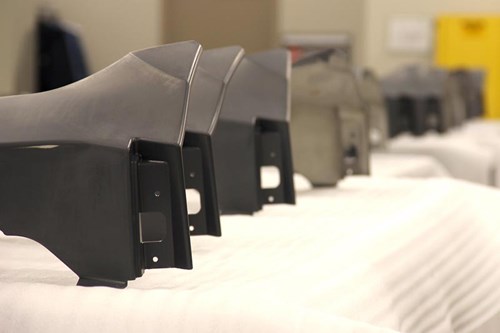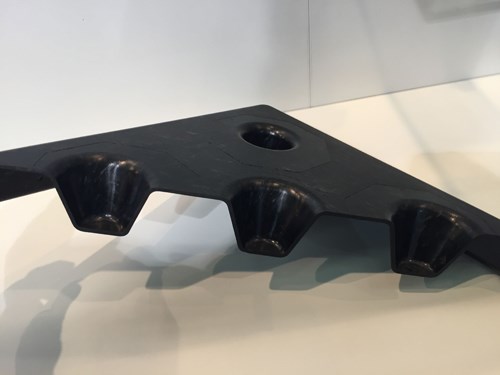Teijin + CSP = Tier 1?
The news yesterday that Teijin Ltd. is buying Continental Structural Plastics (CSP) might have seemed, at first glance, like an odd pairing, but you need to mull it over only a few minutes to see that it makes sense.

Continental Structural Plastics (CSP) composites parts.
The news yesterday that Teijin Ltd. is buying Continental Structural Plastics (CSP) might have seemed, at first glance, like an odd pairing, but you need to mull it over only a few minutes to see that it makes sense.
First, CSP is very well established in the automotive supply chain and knows how to interact with automotive OEMs. CSP has a long and strong history of providing quality composite parts and structures to a variety of vehicle platforms and offers Teijin an easier (if not easy) path into the automotive manufacturing world.
Second, Teijin has been, for at least six or seven years, been orienting itself to become a reliable supplier of carbon fiber composite materials and manufacturing processes for the automotive market, most recently taking the wraps off of its Sereebo high-volume, thermoplastic-based process for automotive applications.

Teijin Sereebo-made demonstration part, from JEC World 2016. The Sereebo process combines thermoplastic resin with carbon fiber in a high-speed compression molding operation.
Third, it's clear (to me, at least) that the automotive industry, if it wants to use more composite parts and structures, is going to need companies like Teijin and CSP to at the least work collaboratively (if not merge) to help develop materials and processes for high-volume manufacturing. The combination of chemistry, process and supply chain knowledge that the automotive industry needs requires a teaming of companies and resources in the supply chain to help overcome the hurdles that composite materials still face.
Fourth, Teijin and CSP each bring to the relationship a strength that the other lacks. CSP, for instance, is well known for its sheet molding compound (SMC) and resin transfer molding (RTM) capabilities, using glass and carbon fiber. Teijin, as a supplier of carbon fiber, brings carbon fiber in a variety of forms and formats, as well as its compression molding-based Sereebo process.
Finally, as a supplier of carbon fiber, I presume Teijin will be in a position to assure its automotive OEM customers that any supply chain with Teijin/CSP in it will never be wanting of carbon fiber. Indeed, the automotive industry has said in the past that one of its hesitations in using carbon fiber was uncertainty of supply. The Teijin/CSP combination seems to obviate that concern.
Related Content
-
Jeep all-composite roof receivers achieve steel performance at low mass
Ultrashort carbon fiber/PPA replaces steel on rooftop brackets to hold Jeep soft tops, hardtops.
-
Co-molding SMC with braided glass fiber demonstrates truck bed potential
Prepreg co-molding compound by IDI Composites International and A&P Technology enables new geometries and levels of strength and resiliency for automotive, mobility.
-
Infinite Composites: Type V tanks for space, hydrogen, automotive and more
After a decade of proving its linerless, weight-saving composite tanks with NASA and more than 30 aerospace companies, this CryoSphere pioneer is scaling for growth in commercial space and sustainable transportation on Earth.
















